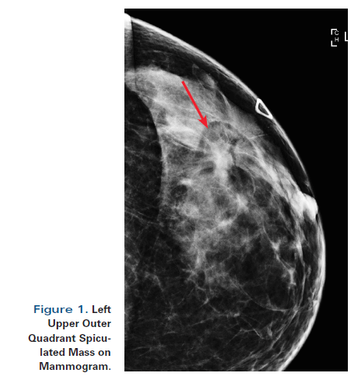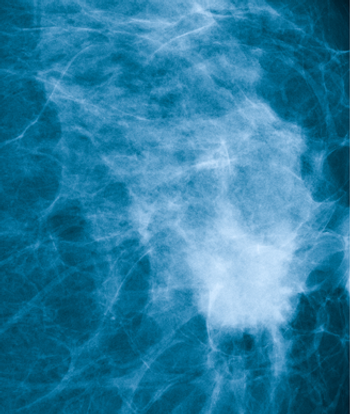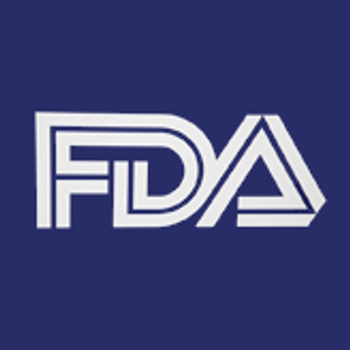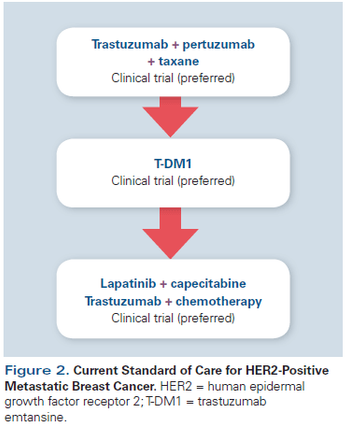
Ultrasound proved better than tomosynthesis at finding breast cancer in women with dense breasts where mammography had not detected any cancer.

Your AI-Trained Oncology Knowledge Connection!


Ultrasound proved better than tomosynthesis at finding breast cancer in women with dense breasts where mammography had not detected any cancer.

A 55-year-old perimenopausal woman presented with a palpable lump in her left breast. Diagnostic mammogram showed a 1.8-cm spiculated mass with scattered microcalcifications within the mass. Comparison with her most recent prior mammogram (about 9 months earlier) showed this to be a new mass.

This landscape of endocrine therapy for metastatic breast cancer is changing rapidly. The recent report that palbociclib improved median PFS when combined with fulvestrant in patients with progression despite prior endocrine therapy is compelling.

In this interview we discuss research into cancer vaccines and checkpoint inhibitors for the treatment of breast cancer.

Two leading breast cancer experts debated the proposition that platinum-based or other additional systemic agents should be used in difficult-to-treat cases of high-risk triple-negative breast cancer.

Clear guidelines about the utilization of MRI in breast cancer detection and management are needed, as the modality is being overused in women for whom it offers few benefits (and potential harms), and underused when it might be appropriate.

In a review of axillary management, it was found that regional node irradiation is likely important in reducing distant metastasis in high-risk breast cancer.

With increasing maternal ages worldwide, patients undergoing breast cancer treatment while pregnant is becoming a more common experience in clinical oncology.

Not all DCIS is dangerous, and the prognostic genomic Oncotype DX DCIS Score allows for routine risk stratification of patients to avoid unnecessary treatment.

A quarter of women with HER2-positive breast cancer treated with a combination of lapatinib plus trastuzumab prior to surgery had significant tumor shrinkage within 11 days.

In light of the recent announcement by Vice President Joe Biden to infuse the US cancer research program with $1 billion, a so-called “Moon Shot” program, we are speaking today with Giulio Draetta, a clinician and cancer researcher at MD Anderson Cancer Center at the University of Texas in Houston, who leads that center’s Moon Shots program.

The FDA has expanded the indication for palbociclib (Ibrance), to be used in combination with fulvestrant in women with HR-positive, HER2-negative advanced breast cancer.

A study including nearly 30,000 women found that newly diagnosed early-stage breast cancer patients often undergo advanced imaging tests, in spite of recommendations against this practice.

ASCO updated guidelines, recommending that higher-risk premenopausal ER-positive breast cancer patients receive ovarian suppression with adjuvant endocrine therapy.

This review will summarize the current standard of care; key issues that arise when treating patients with HER2-positive disease; and developments in novel therapeutics, including small-molecule inhibitors, nanoparticles, immunotherapy, and agents targeting resistance pathways.

While we continue to be thankful for incremental gains in the treatment of our patients with metastatic HER2-positive breast cancer, much work remains in order to optimize and individualize care.

Young breast cancer patients increasingly undergo genetic testing for BRCA1 and BRCA2 mutations. Testing also appears to influence surgical treatment decisions.

Some adult-onset cancer survivors have an increased risk of developing cardiovascular disease later in life compared to noncancer controls.

ASCO has published a guideline on biomarker use to guide decisions for adjuvant systemic treatment for women with early-stage, invasive breast cancer.

Despite clinical trial evidence and recommendations that certain older breast cancer patients can forego radiation therapy after lumpectomy, most older patients continue to receive radiation therapy, according to a new study.

In this interview we discuss the effect of breast cancer treatments on fertility and the role oncologists can play in facilitating fertility care for their patients.

A novel prediction model can help predict long-term overall survival among breast cancer patients with distant metastases, according to a new study. The model could be used as a decision-making tool for physicians and patients.

More than 15% of men and women over the age of 65 may have received breast or prostate cancer screening not recommended by current guidelines.

Breast cancer survivors with estrogen receptor (ER)-positive disease had a lower annual risk of recurrence within the first 5 years after diagnosis, though these patients then had higher rates than ER-negative patients after 5 years.

Mice fed sugar at levels comparable to those in a typical Western diet had greater tumor growth and metastasis compared to mice fed a starch-based, no-sugar diet.